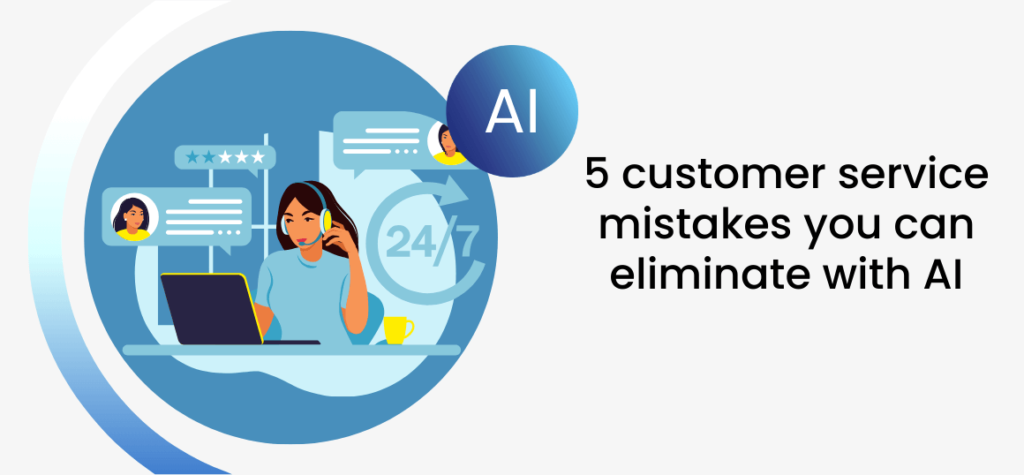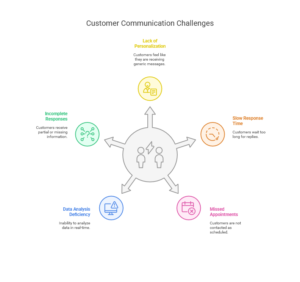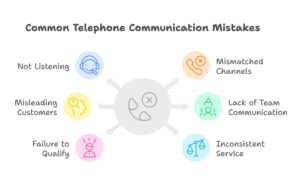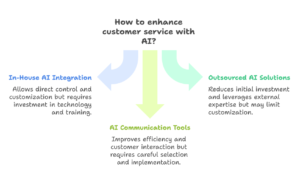5 customer service mistakes you can eliminate with AI

5 customer service mistakes you can eliminate with AI
Customer service departments have been supported by modern technologies for years, including artificial intelligence (AI). This enables the streamlining of many processes and improves the quality of services provided. However, customer service representatives often make certain mistakes in their daily work. We’ve prepared a list of 5 common errors that can be eliminated through the proper implementation and use of AI. Read on to learn more.
Customer service should be perfected down to the smallest detail
From experience, we know that the customer service area within a company should be refined in every detail. It’s a powerful way to build a valuable competitive advantage and to better meet customer needs. It also helps shape the brand’s image and strengthen its market position. Without a doubt, the quality of customer service significantly impacts customer loyalty and repeat purchases of products or services. However, daily operations are not without mistakes in customer service —errors that can harm the company’s reputation and drastically lower customer satisfaction. Fortunately, many of these issues can be avoided by combining artificial intelligence with the high-level competencies of customer service representatives. In the following section of this article, we’ll present some example solutions.
Here are 5 customer service mistakes that AI can help you eliminate
For years, we’ve been supporting our clients in implementing artificial intelligence to improve efficiency and the quality of customer service. Based on our conversations with clients and our experience, we’ve prepared a list of 5 key mistakes that can be easily eliminated with the help of AI. Check whether your team is making these errors—and help them avoid them.

1. Lack of personalization in customer communication
Each year, customer awareness continues to grow. This directly influences their expectations for service and their individual needs. Today, professionalism alone is no longer enough. Personalization in communication—meaning a complete focus on the customer’s specific needs—is more important than ever. The higher the level of personalization in communication and offers, the greater the chance of closing a sale. It also positively affects the company’s image. So what’s standing in the way of adopting this approach? It’s not just about the skills of a sales or customer service representative—access to historical customer data also plays a crucial role. How can you address this?
Artificial intelligence and tools such as CRM systems are invaluable in this area. They give employees real-time access to customer data, including previous interactions and orders. This makes conversations smoother and improves contact management—across various channels like phone, email, and social media. Today’s CRM providers are increasingly focusing on automation and data analytics powered by AI algorithms. Implementing such systems and integrating them with call center solutions (like our EasyCC) or a Voicebot significantly enhances the level of communication personalization.
2. Response time to customer inquiries is too long
One of the most common mistakes made in the sales and customer service process is taking too long to respond to a customer inquiry. In practice, this means that a customer’s attempt to contact the company goes unanswered for many hours—or even days. This leads to growing frustration on the part of the customer and negatively affects the company’s reputation. Sometimes, a customer only receives a response after several attempts to reach out, which is completely unacceptable. The competition is always ready to seize such opportunities. Regardless of the industry or its specifics, it is crucial to stay fully focused on customer needs and respond promptly.
How can AI help? Voicebots are an excellent solution here. They can engage in real-time, 24/7 voice conversations with customers. Today’s voicebots are capable of handling full communication in the case of the most common types of inquiries—including answering FAQs, operating hotlines, and processing complaints. If the voicebot cannot resolve an issue, it then forwards the case to a human consultant. This structure significantly reduces the customer’s waiting time for a response, thereby improving both customer satisfaction and service quality.
3. Failing to contact the customer at the agreed time
Did a consultant schedule a call with you for a specific day and time—but the call never came? This situation is frustrating. Unfortunately, such mistakes still occur in customer service. While unexpected events can sometimes cause delays, in most cases, this results from a lack of respect for the customer, poor calendar management skills, or simple forgetfulness. This is unacceptable for any company that values building and maintaining strong customer relationships and delivering a high standard of service.
AI-powered tools for planning and managing consultants’ calendars are growing in popularity. They are used by customer service specialists, salespeople, and professionals in other roles. These tools allow for seamless integration of meeting calendars (e.g., Google Calendar) with CRM systems and call center software. In practice, this means consultants receive timely reminders, ensuring that scheduled calls are not missed. High-quality customer service includes punctuality and respecting the other person’s time. If, for any reason, a call or meeting can’t happen as planned, the customer should be informed in advance and offered a new appointment—as soon as possible. AI-driven tools that support daily calendar management include ClickUp, Reclaim, Trevor, Ruch, Clara, and others.
4. Lack of real-time data analysis
A solid customer service strategy should ensure that consultants have access to real-time data—as already mentioned earlier in this article. Unfortunately, a lack of such access or failure to utilize available data is still a common mistake in customer service. Even when access exists, many specialists choose to “go with the flow” and ignore valuable insights. This hinders not only personalized communication but also delays effective resolution of customer issues or inquiries.
Modern AI solutions can highlight key information about the customer and the issues they’ve previously faced. For new customers, AI tools can display their current stage in the sales funnel along with any prior interactions. Moreover, AI is capable of analyzing customer sentiment and communication tone, generating product or service recommendations, and more. As AI technology continues to evolve, it is increasingly being used in areas like voice biometrics and identity verification based on a customer’s voice and pre-recorded voice patterns. This significantly supports consultants in their work and enhances real-time data analysis—ultimately boosting customer service effectiveness. Every conversation matters when your company aims to elevate service standards and maintain them at a high level.
5. Incomplete or missing responses to customer inquiries
What’s the final mistake in our top five? Without a doubt, it’s one of the most common in customer service: failing to respond to a customer inquiry or providing only a partial answer. Also included in this category are responses from consultants stating that they are not responsible for a particular matter and cannot assist. The truth is, every employee contributes to building customer relationships and the company’s reputation. In practice, this means it is the consultant’s responsibility to provide a thorough and accurate response to the customer’s inquiry. If that’s not possible at the moment, they must follow up with a complete answer as soon as possible.
How can AI help? Analytical tools powered by AI are invaluable here. They can process large data sets and deliver relevant information quickly. All it takes is entering a query or command, and the AI tool searches the company’s internal resources (such as regulations, user manuals, or terms and conditions) for the best possible answer. This reduces the time required to resolve an issue while improving the completeness and reliability of the response. This approach builds customer loyalty and raises the quality of service delivered. In this context, AI tools prove to be extremely useful, helping customer service departments—especially call centers—avoid many common and costly mistakes.
What other mistakes do consultants make when communicating with customers?
The five examples above highlight common mistakes made by customer service specialists—mistakes that can be effectively eliminated with the help of artificial intelligence. Of course, these are not the only errors consultants make. Unfortunately, working in this field is highly demanding. High employee turnover—especially in customer service roles—makes it even more difficult to maintain high standards. The better the working conditions and the greater the support from modern tools, the easier it becomes to retain staff. This, in turn, helps maintain and improve employee competencies over time.
Some other common mistakes in telephone communication with customers include:
- not listening to the customer and relying solely on pre-written scripts (including a lack of active listening);
- failing to match communication channels with customer expectations;
- misleading customers while resolving their inquiries;
- lack of internal team communication, which hinders efficient case handling;
- failure to properly qualify the customer;
- inconsistent communication and varying service quality between consultants.

AI also has applications in many of these areas. AI-powered tools can, for example, handle the customer qualification stage and assign inquiries to the appropriate consultant. They also help ensure a consistent and high-quality standard of communication, which enhances the company’s credibility in the eyes of customers. Proper implementation—and smart use—of AI tools significantly improves the quality of work within customer service departments. However, every implementation should be tailored to the specific nature of the company and its business context.
Artificial intelligence as a customer service support tool – how to use it
AI proves effective in customer service regardless of whether a company manages this department in-house or outsources it to a call center provider. These tools are used to improve call center management and support consultants in their daily work by providing them with valuable data. In terms of communication, it’s worth considering tools like voicebots and chatbots. Specialists often spend a considerable amount of time documenting call details, updating CRM systems, or preparing follow-up emails for customers. This area can be supported by tools that automatically generate summaries of phone calls, offering high transcription accuracy and saving time.

By implementing AI in customer service, companies not only streamline the work of specialists—enhancing their productivity and effectiveness—but also reduce the risk of errors that can negatively impact service quality, customer satisfaction, and brand image. With customer service automation, intelligent calendars, and comprehensive call center systems, many common mistakes can be avoided. If you have any questions or doubts about implementing AI in your company, don’t hesitate to reach out to one of our experts.
For years, we’ve been helping businesses across various industries optimize customer service operations using AI tools. We’ll take a close look at your business situation, your needs, and those of your customers. Based on that, we’ll prepare a customized proposal and scope for potential implementation. Throughout the entire process, our experienced specialist will guide you step by step. Now you know which mistakes to avoid—and how to avoid them. And you’ll do it with EasyCall. Get in touch with us today.
